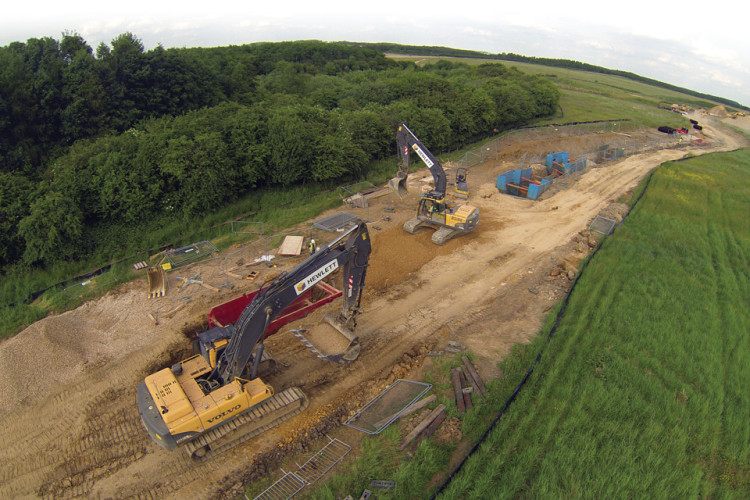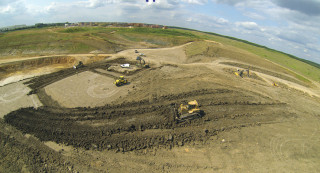The 150-odd householders who moved into new homes at Priors Hall Park near Corby three years ago were looking forward to 21st-century village life with modern facilities and cutting-edge architecture set amid the Northamptonshire countryside.
The marketing boys had certainly pushed the boat out for their reputed £1.3m fee. They rebranded the region “North Londonshire” to attract people up from the Smoke 90 miles away. Even Corby – which, with the best will in the world, is still a down-at-heel former steel town – was described as “vibrant, cool and edgy”.
The fact that some proud Northants residents mounted a vociferous Facebook campaign condemning the North Londonshire monicker wasn’t a major problem. Nor, even, was the fact that to half the population “Corby” means “trouser-press”. What was a problem was the recession that hit rock-bottom just as Priors Hall Park was trying to get off the ground. Corby Borough Council had granted outline planning permission for 5,100 new homes and work on the huge 1,000 acre site was expected to provide hundreds of new jobs in the area. But when the crash came, everything ground to a halt.
About 200 homes had been built and about three-quarters of them sold when the big house-builders who had signed up with landowner Bela Partnership to develop Priors Hall Park simply stopped building. The 200 homes and their disillusioned occupants sat in the middle of a deserted construction site surrounded by half-finished roads, empty schools and with none of the shops, parks and other infrastructure they had expected to find.
Bela CEO Alfred Buller admits that the recession was a cruel blow: “The builders were no longer there to buy parcels of land,” he says. But rather than throw in the towel, Bela ploughed on, seeking funding to kick-start the project again.
At the beginning of this year, with signs of a recovery in house-building gathering pace, Bela secured a £5m grant from the Homes & Communities Agency to fund infrastructure work, while house-builders including Barrett, Taylor Wimpey, Hunter Homes and David Wilson, were back on the scene again. But before much more house-building could take place, Bela had to get the roads and infrastructure package started again. The original groundworks contractor had long since parted company with the developer and a new contract was awarded to Leeds civil engineering company Hewlett Construction.
Hewlett knows only too well what it feels like when the recessionary axe falls and its £12.5m infrastructure contract for Priors Hall Park came at just the right time. Only two months before work started on site, Hewlett had had to be rescued by an emergency management buy-out after being put in administration unexpectedly by its bankers (see box).
Retaining its fleet of earthmoving machinery, the newly-revived Hewlett Construction was appointed by Bela to carry out all the infrastructure work at Priors Hall Park, from the roads and pavements to sewers, drainage and site preparation for the house-builders.
With its main contract (facilitated by a £12.5m “Get Britain Building”grant) under its belt, Hewlett has since secured additional contracts at Priors Hall Park, including a site preparation contract with Barratt Homes for the next stage of development, bringing the total value of work to £19m.
Above: Hewlett's contract includes extensive landscaping and road construction. The company is also crushing and screening its own aggregate quarried from a borrow-pit on site.
.png)
On the strength of this, Hewlett announced in October that it would be opening a new regional office in Corby from where it could better manage the work. “Corby is being transformed and developers are here with a vengeance,” commented Hewlett managing director Alan Cooper. “This presents a massive opportunity for our business and we firmly believe Corby is the right place for us to have a third regional office.”
The site, which is largely occupied by old ironstone workings that served the now defunct steel-making industry in Corby, is a mixture of green-field and brown-field land, though none is badly contaminated. “There’s really no contamination to speak of, although there is a small area of landfill. The majority of it is simply being turned over, filled and brought up to spec,” comments Hewlett’s contracts director Lee Ferreday. Work on site began in March with Hewlett picking up where the previous contractor left off and completing some of the unfinished roads. By the end of 2014 Hewlett will have built 30,000m2 - approximately 7km - of road ranging from main spine roads and avenues to block-paved side-roads and cul-de-sacs. The company is also building a new link to join up with the A43 trunk road to the east of Corby.
All the earthmoving work is being carried out by Hewlett in-house. “We doing nearly everything ourselves,” says Ferreday, with only a few specialists required – for example, an electrical specialist to connect the street lighting, which Hewlett is also installing. In total, Hewlett is supplying 22 excavators and seven 30t articulated dump-trucks - mostly Volvo and Komatsu machines – plus four bulldozers to carry out the heavy muckshifting work. Most of the excavators are in the 30-40t class, says Ferreday. Also deployed on site are five crushing and screening machines to process aggregate. “We’re raising as much aggregate as possible on site and have developed a borrow-pit to provide the stone,” explains Ferreday.
The local iron-bearing limestone has been thoroughly tested and was found to be suitable both as Type 1 fill and as a cementitious aggregate, he adds. “We’re even replacing some of the asphalt base-course with a cementitious layer in the roads.” This has drastically reduced the requirement for imported aggregate and bitumen. Ferreday says that the only bulk materials Hewlett is importing are cement for the base course and bitumen for the black-top wearing courses. An added bonus is that the site-won aggregate is not caught by the Aggregate Levy, which adds to the cost saving.
Vehicle movements to and from the site are also minimised, reducing local road congestion and slashing vehicle emissions. “So far we’ve processed about 14,000m3 in two weeks,” says Ferreday. “And we estimate that we’ll save around 1,000 wagon movements just on tarmac alone.” In the eight or nine months to date, Hewlett has shifted around 500,000 tonnes of earth and installed over a kilometre of drainage pipe.
Now almost half-way through its contract, Hewlett is already in early discussions with Bela about further work at Priors Hall Park. “This contract only covers what we call Zone 1, which is an area of about 350 acres,” says Warren Jones, assistant project manager with Bela Partnership. “The whole site is roughly divided into three zones, and Zone 1 will be for 1,300 to 1,400 homes.” Development of all three zones on the 1,000 acre site is a 10-year project at least, adds Jones. It all depends on the housebuilders who will be watching changes in the housing market very closely before committing to develop parcels of land. “Timescales can change,” says Jones – an observation which the 150 householders already living at Priors Hall Park can readily appreciate. But at least the initial hiatus is now over and they can see signs that the modern village lifestyle they were promised is moving a bit closer.
{{image 3}}
The fall & rise of Hewlett
In January 2013, after 25 years as one of the UK’s largest privately-owned civil engineering contractors, Hewlett Group suddenly went into administration.
The Yorkshire-based company, which comprised four divisions including Hewlett Civil Engineering, had seen turnover slide by over 30% from £62m in 2009 to around £42m in 2012 and was facing mounting debts. Managing director Alan Cooper claimed at the time that the banks’ decision to appoint administrators BDO was a “hostile” move, both unexpected and harmful to the business.
So he decided to fight and, with the backing of John Duffy, owner and founder of the company, led a management buyout of the business which saved 300 jobs and allowed the business to carry on trading as Hewlett Construction. Although the new company has reportedly struggled to recover some of the debts owing to the previous Hewlett companies and repay the £1.5m owing to BDO, the £12.5m infrastructure contract on Priors Hall Park has proved a welcome shot in the arm – possibly a life-saver – for the new company.
Got a story? Email news@theconstructionindex.co.uk




